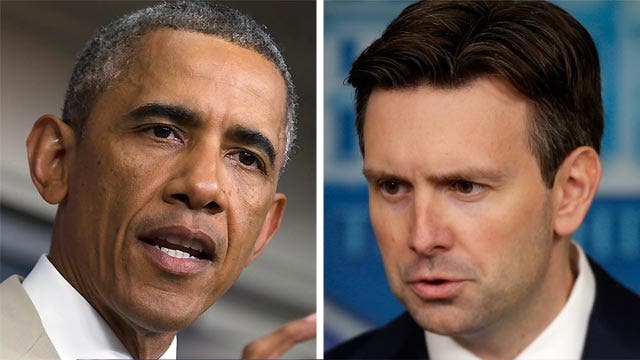Administration scrambles to deal with no strategy admission
Ed Henry reports from the White House
President Obama is facing intense criticism for admitting Thursday "we don't have a strategy yet" for dealing with Islamic State militants in Syria, despite warnings from top military advisers and others that the group must be confronted on that side of the border.
The president made the comment during a briefing with reporters in which he overtly played down the prospect of any imminent military action in Syria. He tried to temper speculation that he was about to roll out a "full scale" strategy, one that might expand the current, limited airstrike campaign in northern Iraq.
"I don't want to put the cart before the horse. We don't have a strategy yet," Obama said.
As the White House later clarified, he was talking specifically about a military strategy for Syria. But Republican critics pointed out that the ISIS presence in Syria has been festering for a long time, and is only growing in strength.
Sen. John McCain, R-Ariz., one of the toughest critics in Congress of the administration's Middle East policies, tweeted the president's quote with a reminder: "#ISIS is largest, richest terrorist group in history & 192,000 dead in #Syria."
Karl Rove, Fox News analyst and former George W. Bush administration adviser, said he was "appalled" by the president's comment.
"He was warned about the role that ISIS was playing inside Syria, and he has had all that time to develop a strategy about what to do about ISIS in Syria and he still doesn't," Rove told Fox News.
Rep. Paul Ryan, R-Wis., at an event in California Thursday night, said the U.S. needs a "strategy to finish them off."
"Not to contain them ... but to fundamentally finish them off. And I don't think the president sees this moment for what it is," he said.
Obama said Thursday that military leaders are presenting him with a "range of options" for addressing the Islamic State. The administration is clear that they have a strategy for Iraq -- which, for now, involves limited airstrikes and humanitarian missions -- and are working on one for Syria.
Following a late afternoon meeting of the National Security Council, the White House put out a statement saying they discussed "our comprehensive strategy to counter the threat posed by ISIL in Iraq and Syria."
White House Press Secretary Josh Earnest also tweeted, amid criticism of the president's comment: "In his remarks today, POTUS was explicit -- as he has been in the past -- about the comprehensive strategy we'll use to confront ISIL threat."
Earnest said Friday, when pressed on the president's remarks, that "I think the president was pretty explicit that he is determined to make sure that every element of his national security strategy is thought through." He said any military decision regarding Syria will be "one that is carefully considered, one that is deliberately arrived at, and one that will be made in close consultation with the United States Congress."
On Fox News, Rep. Louie Gohmert, R-Texas, criticized the "strategy" the administration has taken so far.
"He did say we don't have a strategy, but he followed that up by saying the strategy is to nip it in the bud. Well, unfortunately, it's not in a bud, it's full-blossom," Gohmert said.
Obama intimated during his remarks that the administration would not push forward with any comprehensive plan before Congress returns from August recess early next month and has a chance to weigh in.
But just last week, Chairman of the Joint Chiefs of Staff Gen. Martin Dempsey said the terror group would need to be addressed in Syria if it is to be defeated.
And on Wednesday, Obama's own press secretary suggested a strategy similar to the one in Iraq was being devised for Syria.
"Well, I think the elements of that strategy would not be entirely dissimilar from the elements of the strategy that we're pursuing in Iraq," Earnest said, when asked about what might happen in Syria.
As the president puts a damper on speculation that military action in Syria is imminent, he indicated that for the time being, the U.S. will continue to conduct airstrikes in northern Iraq and humanitarian missions, while working politically and diplomatically to "cobble together" a coalition for whatever the long-term strategy is.
To that end, he said he is sending Secretary of State John Kerry to the region to build a "coalition" to confront the threat.
The president said, once a strategy is formed, there "will be a military aspect to that" and might be a role for an "international coalition" providing air support.
But he was vague on the question of what to do in Syria. Amid speculation over whether the U.S. would ever partner with Bashar Assad to fight ISIS on that side of the border, Obama reiterated his view that "Assad's lost legitimacy."
He said the U.S. would continue to support the "moderate opposition" in the country, giving people a choice other than just Assad or ISIS.
Senate Republican Leader Mitch McConnell, after Obama's remarks, urged the president to develop a "regional strategy" for the Islamic State and present it to Congress and the American people.
"If the President is prepared to engage Congress with a strategic plan to protect the U.S. and our allies from ISIL, I believe he will have significant congressional support," he said. "But don't forget, the threat from ISIL is real and it's growing -- and it is time for President Obama to exercise some leadership in launching a response."





